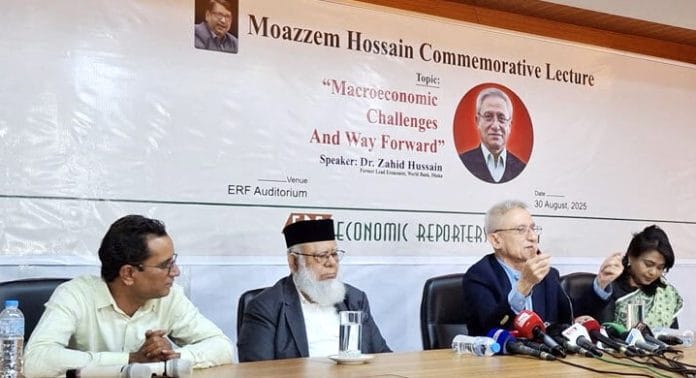Bangladesh has the potential to earn over $2 billion in additional export revenue from the US market in the current fiscal year (2025–26) amid escalating tariff tensions between Washington and its major trading partners, China and India.
The projection came from Dr. Zahid Hussain, former lead economist of the World Bank’s Dhaka office, while speaking at a discussion titled “Macroeconomic Challenges and the Way Forward” at the Economic Reporters Forum (ERF) auditorium in Dhaka on Saturday. The event was organized to mark the Moazzem Hossain Memorial Lecture.
Dr. Hussain said the tit-for-tat tariff measures between the US and both China and India could create strategic openings for Bangladesh to expand its share in the American market, particularly in textiles and other labor-intensive sectors.
He noted that the US has recently doubled tariffs on several Indian goods, some of which now face duties as high as 50 percent—the steepest for any country except Brazil. The move, largely linked to India’s import of Russian crude oil, could affect around $48.2 billion worth of Indian exports, according to Indian government estimates.
“This shift provides Bangladesh with an opportunity to capture a bigger slice of the US market. But to seize it, we need proactive trade policies and stronger export competitiveness,” he emphasized.
Turning to domestic issues, Dr. Hussain reviewed the interim government’s economic management over the past year. He observed that while macroeconomic indicators show signs of recovery, ordinary households remain under strain due to rising poverty and inequality.
“The economy is performing better than in FY2022–23, but the benefits of recovery have not reached the majority. Inequality is widening, and poverty is not falling as expected,” he said.
He credited improved stability partly to leadership changes, reduced money laundering, a slowdown in informal hundi transactions, and rising foreign currency inflows. He also claimed that large-scale looting in the banking sector has stopped, though defaulted loans continue to weigh heavily on banks.
International factors, including a weaker US dollar and favorable global trade conditions, have also helped, he added, noting that disciplined economic management has played a supportive role.
Despite these gains, Dr. Hussain warned that Bangladesh risks remaining stuck in the middle-income trap due to structural weaknesses: energy shortages, a fragile banking sector, weak logistics, under performing labor markets, and institutional decay.
“Reform requires more than political will. It needs delivery capacity through coordination among the Council of Advisers, government administration, the private sector, and civil society,” he stressed.
He described the current Council of Advisers as “sincere and courageous in some areas, but ineffective or lacking direction in others.”
Also speaking, Mahbubur Rahman, trustee board member of The Financial Express and a leading businessman, voiced frustration over the lack of meaningful change after what he termed the “July revolution,” saying inequality has deepened contrary to public expectations.
The memorial lecture honored Moazzem Hossain, founding editor of The Financial Express and founding president of ERF. ERF President Doulot Akter Mala chaired the session, while General Secretary Abul Kashem moderated.

